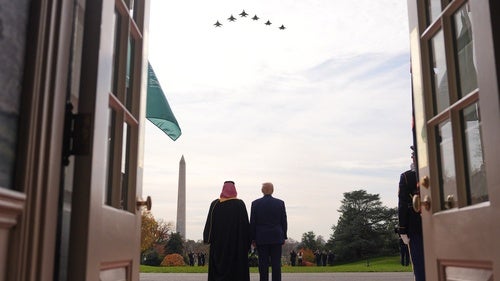In His Pursuit of Peace, Trump Defers the Difficult Details

From the exclusion of Europe in outlining a Ukraine peace plan, a continued push against Venezuela, and his embrace of Saudi Arabia’s crown prince, Trump showed this week that he will disrupt the status quo to deliver on his agenda.
US President Donald Trump entered his second term wanting to be the nation’s geopolitical president and "president of peace.” In his January inaugural address, he said, “We will measure our success not only by the battles we win but also by the wars that we end—and perhaps most importantly, the wars we never get into . . . My proudest legacy will be that of a peacemaker and unifier.”
Ten months in, unifying the world behind his ambition for peace has turned out to be a difficult task, especially in the face of major powers that have their own definitions of success. But Trump has trimmed his personal ambitions, bucked convention, and forged ahead, with this week being a particularly busy one in his pursuit of peace.
On Monday, the United Nations Security Council adopted Trump’s peace plan for Gaza in a 13-0 vote, with Russia and China abstaining. Later in the week, details of a privately negotiated agreement leaked, revealing plans developed by Trump and Russian President Vladimir Putin's advisers to end the war in Ukraine. And Trump has continued to send US warships into the Caribbean to press for change in Venezuela.
Trump also said this week that the United States would be putting a stop to the ongoing civil war in Sudan at the request of Crown Prince Mohammed bin Salman of Saudi Arabia.
“Arab Leaders from all over the World, in particular the highly respected Crown Prince of Saudi Arabia, who has just left the United States, have asked me to use the power and influence of the Presidency to bring an immediate halt to what is taking place in Sudan,” he wrote on Truth Social.
Saudi Arabia’s normalization of its relationship with Israel through the Abraham Accords sits at the heart of Trump’s ambition for Middle East peace. With the quest for a grand bargain seemingly elusive, the president’s announcement of America’s involvement in Sudan was part of a broader effort he is undertaking to deepen US-Saudi ties, which included inviting the crown prince to Washington and hosting a black-tie state dinner for the de factor leader earlier this week.
The crown prince’s visit was the first since the 2018 murder of journalist Jamal Khashoggi and President Joe Biden's determination that the crown prince had given the order to "capture or kill" Khashoggi that led to a diplomatic crisis between the two nations.
Despite staging an elaborate welcome for the crown prince featuring officers on horseback, a military band, and F-35 fighter jets flying overhead, the two leaders left the White House without an agreement on the Abraham Accords. The Middle East ‘deal of the century’ eluded Trump once again in the absence of a genuine solution to the question of Palestinian statehood.
“We want to be part of the Abraham Accords, but we want also to be sure that we secure a clear path to a two-state solution," the crown prince told reporters.
The UN vote approving the plan for Gaza similarly left critical questions about the future role of Palestinians in the day-to-day governance of Gaza unanswered.
Trump did, however, walk away with a few significant pledges of support that, if realized, could prove to be lucrative for America. The crown prince left Washington agreeing to invest $1 trillion in the United States. And in a move that suggests Trump’s determination to deepen the relationship—and despite its impact on Israel's regional superiority in stealth technology —Trump agreed to sell Saudi Arabia F-35s and formalized the designation of Saudi Arabia as a major non-NATO ally.
In each case this week, Trump pursued peace through a different approach: adopting pragmatism in his meeting with the crown prince, agreeing to major concessions in his plan for Ukraine, and deploying force in his approach to Venezuela.
In each case this week, Trump pursued peace through a different approach: adopting pragmatism in his meeting with the crown prince, agreeing to major concessions in his plan for Ukraine, and deploying force in his approach to Venezuela.
When it comes to Venezuela, the ultimate goal of Trump’s current policy approach is more difficult to discern, but it has raised questions from at least one key US ally (the United Kingdom) and several congressional Democrats about its legality. A group of House Democrats introduced a measure this week that would effectively prevent Trump from using the military against Venezuela without lawmaker approval. Two similar efforts by Senate Democrats have failed, and this one appears similarly unlikely to pass.
Trump’s approval of a 28-point “peace plan” for Ukraine has shaken, stunned, and unsettled America's European allies and Ukraine, both of which were excluded from negotiations. The proposal requires that Ukraine surrender the Donbas and limit its own defense capabilities, and that NATO troops refrain from entering Ukraine—a key element of European plans to support the country and ensure its security after the war.
European leaders (several already in South Africa for the G20) responded with a statement saying that “any agreement affecting European states, the European Union, or NATO requires the consent of European partners or a consensus among allies.”
Trump’s push against Venezuela, his bilateral dealmaking with Saudi Arabia, and his exclusion of Europe in agreeing to a plan for Ukraine with Russia confirm the president's determination to deliver on his peace agenda—even if it means excluding key stakeholders, sidestepping international law, and deferring the difficult details for later.
The challenge now is for Trump to translate these deals into wider wins and, ultimately, the lasting peace he promised. Bringing stakeholders on board will be critical to this. It remains to be seen, for example, whether Americans will support Trump’s embrace of Saudi Arabia. Recent Chicago Council-Ipsos polling shows that 61 percent of Americans view Saudi Arabia as playing a negative role in resolving key problems facing the Middle East and feel about as warmly toward the nation as they do China.
Without clearly defining the next steps and securing the buy-in of key regional partners and allies, it is difficult, if not impossible, to see how the president's ambitions materialize.

